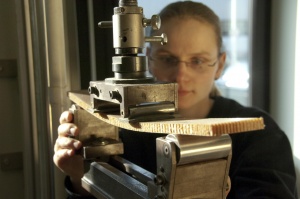Every discussion about composite materials seems to mention their unusual strength, resilience or elasticity. They are used to coat shoes, make jets stronger and cars safer and are recognized in a wide range of industries – from civil engineering, oil and gas to aerospace. But what’s next? Our guest speaker Prof. Gilles Lubineau believes he can see the path ahead.
In his seminar he will focus on the need to further develop multi-functionality and multi-physics approaches to composite materials. Study cases will be presented to illustrate, in very practical situations, the need for better composite based engineering from the material design to the field operations.
May 28, 2014 13.30 – 15.00 Sao-Paolo Auditorium, Brazil cluster Skolkovo School of Management
Seminar Title: «MULTI-FUNCTIONALITY AND MULTI-PHYSICS FOR COMPOSITES ENGINEERING: SOME APPLICATIONS FROM NANO TO MACRO»

Composites offer tremendous durability and strength, and allow the design of complex geometric forms and the engineering of bespoke materials. Image courtesy Nick Cross / Gurit, Flickr.
ABSTRACT:
Composite materials are now recognized in a wide range of industries as viable candidates when excellent mechanical properties are required. Yet, increasing the reliance on composite parts in the design and meeting future challenges for cost efficiency and reduced environmental impact will require better mastery of the way we design with these materials.
Some key challenges have to be solved to improve composite based design. Multi-functionality is important to ensure integration. Aging, especially under multi-physics loading starts to be critical in any industry, from civil engineering, oil and gas industry to aerospace. Advanced structural health monitoring is also needed to push the design limits so that the designer has continuous feedback about how the structure evolves with time.
This talk will give a general overview of my research activities in these different areas, and will highlight the need for having a highly multidisciplinary and across-the-board team to tackle such complex issues. Among the topics presented are:
• Multifunctional composite materials. Development and optimization of hierarchical composites for tailored mechanical/electrical/thermal properties.
• Integrity/Durability of composite materials and structures.
• Inverse problems for identification of constitutive parameters and/or monitoring.
• Multi-scale coupling techniques for objective prediction of failure.
Study cases will be presented to illustrate, in very practical situations, the needs for better composite based engineering from the material design to the field operations.

Professor Gilles Lubineau, the Skoltech seminar guest speaker May 28
SPEAKER INTRODUCTION:
Prof. Gilles Lubineau is the principal investigator for COHMAS (COmposite and Heterogeneous Materials Analysis and Simulation), an integrated environment for composite engineering that he created in 2009 when joining KAUST as an Associate Professor.
Current research interests include: short and/or long-term integrity of composite materials and structures, inverse problems for the identification of constitutive parameters, multi-scale coupling technique, multifunctional materials and modeling.
Before joining KAUST, Prof. Lubineau was a faculty member at the École Normale Supérieure of Cachan, and a non-resident faculty member at the École Polytechnique, France. He also served as a visiting researcher at UC-Berkeley. Prof. Lubineau earned a PhD degree in Mechanical Engineering from École Normale Supérieure de Cachan (ENS-Cachan), France. In 2004, he received the Daniel Valentin Award for best innovative works related to the field of composite materials. Prof. Lubineau was ranked 1st at the agrégation in theoretical mechanics and was granted his research habilitation in Mechanics in 2008. He is a member of various Editorial boards (including the International Journal of Damage Mechanics).
